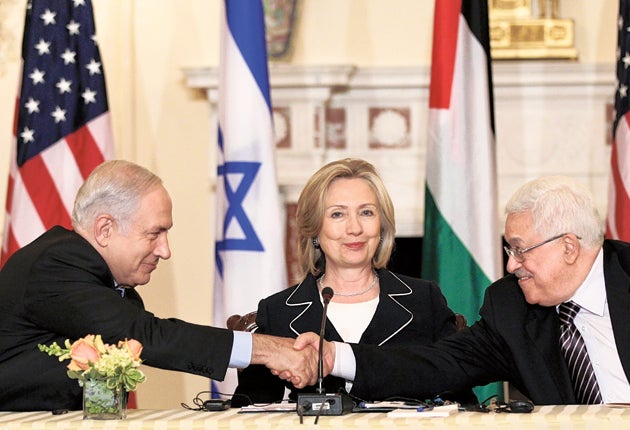There is hope of compromise if Israelis and Palestinians can lose their sense of righteousness
Should one side persuade others to their point of view, or do they only want to listen to the reverberations of their own outrage?


Your support helps us to tell the story
From reproductive rights to climate change to Big Tech, The Independent is on the ground when the story is developing. Whether it's investigating the financials of Elon Musk's pro-Trump PAC or producing our latest documentary, 'The A Word', which shines a light on the American women fighting for reproductive rights, we know how important it is to parse out the facts from the messaging.
At such a critical moment in US history, we need reporters on the ground. Your donation allows us to keep sending journalists to speak to both sides of the story.
The Independent is trusted by Americans across the entire political spectrum. And unlike many other quality news outlets, we choose not to lock Americans out of our reporting and analysis with paywalls. We believe quality journalism should be available to everyone, paid for by those who can afford it.
Your support makes all the difference.In the weeks preceding the recent Israeli elections, wise and conscientious commentators believed that here was an opportunity to change the game.
The country was tired. Many Israelis saw no end or happy outcome – neither victory nor peace – to the Gaza conflict. The diaspora Jew was falling out of love, if not with Israel itself then with Netanyahu and the rigidity of his policies. The Arab world, beset by so many other problems, would surely put its weight behind any resumption of the peace process. I don’t claim all these things are true, only that they were perceived as true.
It would be easy to say now that with Netanyahu’s ugly re-election, that opportunity has been squandered. It felt that way to me on the morning I woke to news of the election result. I am tempted to say it felt that way to many other English Jews of my acquaintance too, but it’s probably better, when it comes to these matters, to speak only for oneself. The business of citing views that accord with your own, and then calling them brave, as my colleague on this paper Yasmin Alibhai-Brown did earlier this week, though they were no more than the usual free-hit expressions of anti-Zionism, is not productive.

Speaking only for myself, then, Netanyahu’s electoral victory, to obtain which he had sunk low indeed, seemed like the end of hope. Damn the lot of them, I am inclined to feel at such a time. But that’s not a useful or brave thing to think either. In fact, I’d like to ban the word bravery from this debate altogether. Better to be smart than brave. And the smart thing is to accept that peace is the child of compromise and compromise is possible only when each side bites back its sense of righteousness. Israel is more right than wrong in my eyes, but what’s served by going on saying that?
All talk of courage aside, may I suggest that the opportunity we think has gone could just be lurking in the debris of yesterday’s hopes. I happen not to think Netanyahu is a fool or a scoundrel. I understand the apocalyptic fears that drive him. People who say they want to kill Jews often mean it. When the BBC’s Middle East editor Jeremy Bowen called out Netanyahu for “playing the Holocaust card” during his recent address to Congress, he showed himself ill-equipped to report on events important to Jews. Were I to tell Palestinians to stop banging on about the Nakba and get on with enjoying occupation, I’d be called a callous fool. That which we will not imagine, we cannot speak of. A commentator who thinks the Holocaust is no more than the ace in a Jew’s deck of grievances is too cynical or too stupid to be listened to. Go quietly, Mr Bowen. You bring discredit to your profession.
But Netanyahu, too, lacks imagination. He is attentive to Jewish apprehension, but blind to the despair of others. To promise neither change nor hope to people dispossessed is inhumane and non-strategic. Thus does a lack of imagination fetter those on both sides of this conflict. And thus, more than ever, should it be clear that whoever doesn’t listen, whoever lacks the imaginative capacity to listen, will be forever padlocked to himself.
There is then, I think, a fresh opportunity for those who are newly disillusioned with Netanyahu, and those who have never expected any better of him, at least to quit their trenches momentarily, but it too will be wasted if it is marked by the unimaginativeness of dogma on either side.
We have to ask ourselves a simple question: do we want to persuade others to our point of view, or do we simply want to listen to the reverberations of our own outrage? I will win no converts to Israel’s cause if I contend that Gazans are to blame for their own afflictions; they should never have put trust in terrorists.
Conversely, I wonder if Ms Alibhai-Brown, though asking Muslims to come out of their trenches, hasn’t dug a new one of her own in asserting that “Israel is now more wicked and dangerous than Hamas”. These wild and whirling words – unsubstantiated and incapable of substantiation – are the mere poetry of impotent rage. Yes, they will find prompt agreement among those who cling moth-like to the coat-tails of any columnist who flatters them with talk of “bravery”, but they do nothing to budge people who ascribe the creeping hopelessness of the situation to other causes.
Is it really so impossible to hold two contrary positions simultaneously? We can love and hate the same person. We can pray to God while not believing for a moment in his existence. And yet it would seem that when Amos Oz asks us to accept that the war between the Israelis and the Palestinians is a war between two rights, or two wrongs, he is asking the impossible. Are we unwilling, as a matter of philosophical principle, to accept the idea that competing views of history can be equally true or false?
D H Lawrence’s The Rainbow ends with Ursula Brangwen, sunk in apathy, seeing a rainbow’s colours gathering mysteriously from nowhere, making a great architecture of light, promising a new growth, sweeping away the old brittleness of people who “crept hard-sealed and separate on the face of the world’s corruption”.
We could do with such a visitation right now. A great arc that moves us, even if we know the science of prismatics and refuse to believe in mysteries, by the brilliance of its colours. Art promises something similar, so much orderly agreement of disparity, so much that might have been discordant finding a beauty in gradation. Not 50 shades of grey – who wants more grey? – but the glitter of iridescence, what George Eliot, describing Gwendolen Harleth, called “the play of various, nay, contrary tendencies”.
Politics ain’t art. We know that much. But we call a subject politics only when we want to feel one way about it. Maybe we should stop thinking about the lives of Israelis and Palestinians as politics.
Join our commenting forum
Join thought-provoking conversations, follow other Independent readers and see their replies
Comments